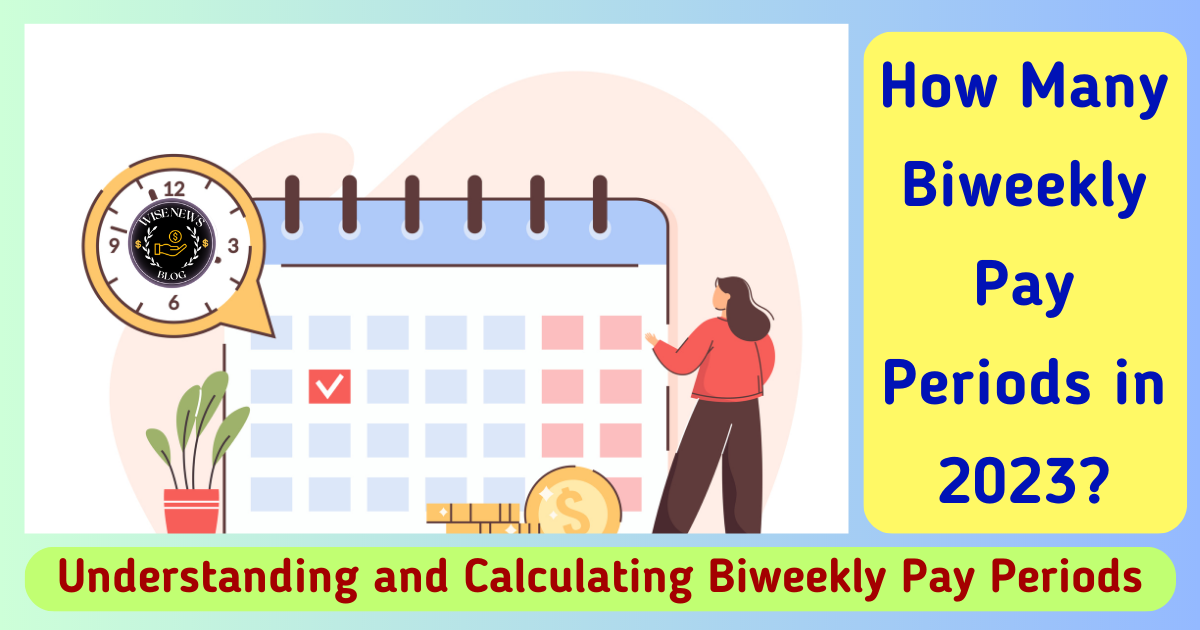Biweekly pay periods are a common payment schedule used by many employers, offering employees the convenience of receiving paychecks every two weeks. However, when planning finances or budgeting, it’s essential to know the exact number of pay periods in a given year. In this article, we will explore How Many Biweekly pay periods there are in 2023, providing a comprehensive understanding backed by facts and statistics.

What is a Pay Period?
Before diving into the article first understand the term pay period means. A pay period is a specific time frame that employers use to determine when they will pay their employees. It’s like a cycle that repeats itself, and it can be weekly, bi-weekly, semi-monthly, or monthly, depending on the company’s policies.

#1. Understanding Biweekly Pay Periods.
Biweekly pay periods refer to a payment schedule where employees receive their wages every two weeks. It is different from a weekly or monthly payment system and offers various advantages, such as consistent cash flow and improved budgeting.
Biweekly pay periods have become increasingly popular among employers, promoting financial stability for companies and employees. As per the U.S. BUREAU OF LABOR STATISTICS, a Biweekly pay period is the most common (36.5 percent) pay period among the other pay period.

#2. How Many Biweekly Pay Periods in 2023.
In 2023, there will be a total of 26 biweekly pay periods. To calculate the number of pay periods in a year, we need to consider the number of weeks in the year and divide it by two, as each biweekly pay period spans two weeks. As 2023 comprises 52 weeks, dividing this number by two gives us 26 biweekly pay periods.
#3. Factors Affecting Biweekly Pay.
Several factors can influence the number of biweekly pay periods in a year. Let’s explore a couple of significant factors that may impact the calculation.
3.1 Holidays and Leap Years.
Holidays and leap years can affect the total number of biweekly pay periods in a year. If there are holidays falling within a pay period, it may result in adjustments to the regular schedule.
Additionally, in leap years, an extra day in February can affect the number of weeks, which can subsequently impact the number of biweekly pay periods.

3.2 Company Policies.
Company policies also play a role in determining the number of biweekly pay periods. Some employers may choose to align their pay schedule with a specific day of the week or month, resulting in a different number of pay periods than the standard 26.
It’s important for employees to familiarize themselves with their employer’s pay policies to accurately plan their finances.

#4. Benefits of Biweekly Pay Periods.
Biweekly pay periods offer several benefits for both employees and employers. Let’s explore a couple of advantages that make this payment schedule popular.
4.1 Budgeting and Financial Planning.
Biweekly pay periods can simplify budgeting and financial planning. With a regular paycheck every two weeks, employees can easily divide their expenses and set aside funds for different financial goals, such as savings, bills, and other obligations. This consistency helps individuals manage their finances effectively.

4.2 Consistent Cash Flow.
Having a biweekly paycheck provides a steady cash flow, allowing employees to maintain a consistent lifestyle. Unlike monthly or irregular payment schedules, biweekly pay periods ensure individuals have a reliable income source every two weeks, reducing financial stress and uncertainties.

#5. Challenges of Biweekly Pay Periods.
While biweekly pay periods offer advantages, they can also present some challenges for individuals. Let’s explore a couple of common difficulties employees may face with this payment schedule.
5.1 Timing and Expenses.
With biweekly pay periods, the timing of paychecks may not always align with monthly bills or other financial obligations. Employees may need to plan ahead and adjust their budgeting strategies to ensure timely payment of bills and avoid any late fees or penalties.
5.2 Adjusting to The Schedule.
Switching from a different pay schedule to a biweekly system can take some adjustment. Individuals may need to reevaluate their spending habits, budgeting techniques, and cash flow management to adapt to the new payment frequency effectively.
#6. Conclusion
In conclusion, 2023 will have 26 biweekly pay periods. Biweekly pay periods provide a consistent and convenient payment schedule for employees, facilitating effective budgeting and financial planning.
However, it’s crucial to consider factors like holidays, leap years, and company policies that can impact the number of pay periods in a year.
By understanding the benefits and challenges associated with biweekly pay periods, individuals can make informed decisions and effectively manage their finances.
FAQs (Frequently Asked Questions)
Q1: Can the number of biweekly pay periods vary between employers in 2023? Yes, company policies may vary, and some employers may choose a different pay schedule, resulting in a different number of pay periods.
Q2: Are biweekly pay periods more beneficial for employees or employers?
Biweekly pay periods offer advantages for both employees and employers. Employees benefit from consistent cash flow, while employers can improve financial planning and reduce administrative costs.
Q3: How can individuals adjust their budgeting strategies for biweekly pay periods?
Individuals can consider creating a monthly budget that aligns with their biweekly pay schedule, setting aside funds for recurring expenses and savings accordingly.
Q4: What happens if a holiday falls within a biweekly pay period?
If a holiday falls within a biweekly pay period, employers may adjust the pay schedule to ensure employees receive their wages before or after the holiday.
Q5: Can individuals negotiate their pay schedule with their employers?
Depending on the company policies and agreements, individuals may have limited or no control over the pay schedule. However, it is always worth discussing any concerns or preferences with the employer.

